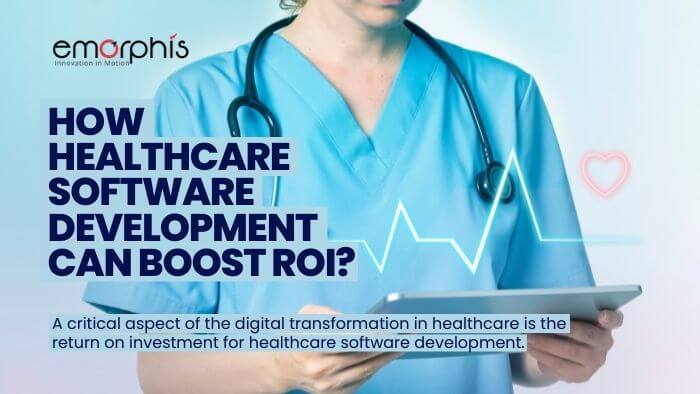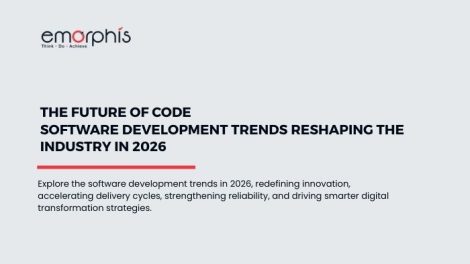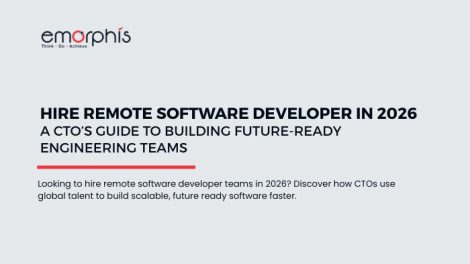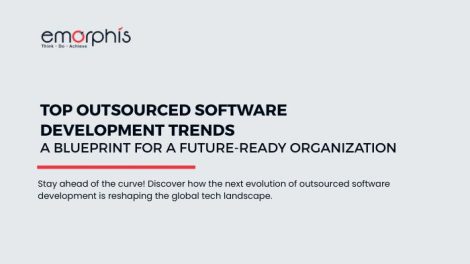Introduction
One of the recent research reports from Accenture indicates nearly 93% of healthcare organizations are transforming & actively implementing digital solutions. Healthcare providers are getting acquainted with trending and innovative technologies from AI to IoT devices. It is an attempt to improve medical practices and boost their competencies. With the assistance of healthcare software and applications, healthcare providers are gaining insights into better care delivery and management. However, a critical aspect of the digital transformation in healthcare is the return on investment for healthcare software development.
Digital Healthcare On The Rise
As the pandemic brought many changes in our daily lives, it has also changed the consumer’s (patient’s) expectation of easily accessible, convenient, and safe healthcare services. It has also skyrocketed the need for healthcare software solutions and medical platforms. This is where the caregivers or healthcare providers had to decide on investing in healthcare software and achieving better returns.
As patients and providers are more interested in digital healthcare, there has been a sudden rise in demand for healthcare technology, and there has been a massive investment. IQVIA & statista.com reports a 135% increase in healthcare application downloads, and more than 90,000 new healthcare software applications entered the global market.
These statistics indicate the interest of healthcare professionals, patients, and caregivers in innovation and hence the need for healthcare software development.
What is ROI on Healthcare Software Development?
ROI for healthcare software development is totally different from the general perspective that 100% of sales growth is attributed to marketing efforts. However, for the healthcare software development industry, which involves a long buying cycle, the decrease in operating costs and long-term sustainability contribute to improvement in ROI.
Considering the present digital scenario, healthcare organizations must have software development processes or outsourcing strategies in place to benefit cross-functional team collaboration and improve the teams’ productivity.
Almost every organization adopting a cloud-first approach, healthcare providers aim to invest in next-gen healthcare software development.
Challenges With ROI For Healthcare Software Development
Healthcare providers consider digital capabilities as a path to improve care delivery and better customer experience. However, the digital transformation journey is long for health systems; hence, healthcare providers tend to create frequent checkpoints to measure their digital initiatives and track ROI.
This is where outsourcing the healthcare software development projects is the best decision. Based on the calculated expected ROI for the healthcare software project, its work starts as the yield is positive ROI. As the work is outsourced to an experienced team, they are well aware of the issues and keep sorting them as predicted. Also, custom healthcare software development can help in reinventing operations and establishing reliable software systems.
As the consumer now expects healthcare services to be easily accessible, convenient, and safe, this has encouraged enterprises and start-ups to pour investment and accelerate healthcare software project development.

The Challenges
Some of the significant ROI challenges addressed through outsourcing healthcare software development projects are:
- Integration with legacy systems: With the use of digital gadgets, consumers and patients share data with a healthcare provider and expect in turn, that the software system maintains privacy and data interoperability with healthcare entities. Ready solutions find it difficult to integrate with traditional systems, leading to data loss and calls for an experienced team to migrate from one system to another. Custom software development helps better integration and migration by preventing delays and download time affecting the patient experience.
- Security: Healthcare devices or software must align with security regulations and customer expectations. Data security is one of the key areas that is a concern for any healthcare organization. With the help of data encryption and securing the transfer of data within the system can help overcome this challenge. A healthcare software development company can very well undertake projects and create various checkpoints while creating database tables and placeholders for value entry. A password policy and MFA (Multi-Factor Authentication), cloud infrastructure security, audits, and monitoring are a few of the service points that can help determine the security of your healthcare solution.
In addition to the above
- Healthcare Compliance: When it comes to safeguarding healthcare provider practice and patients, healthcare compliance is everything. If your practice does not adhere to industry norms and laws, you expose yourself to security concerns and revenue. As technology evolves and new solutions are offered like telehealth app development. The providers will only encounter new changes in healthcare compliance. To avoid compliance issues, it is much recommended for a healthcare organization to partner with a healthcare software development company providing HIPAA and GDPR-based healthcare software solutions.
- Economical & Efficient: The challenge of adopting a technology product for good ROI has always been a concern. As the cost of development, handling the team can in turn hamper the economic efficiency of the healthcare services. To overcome such challenges outsourcing healthcare software development can be a good option. Hiring an expert healthcare software development company saves the cost of recruiting professionals for different stages of development, such as UI designers, developers, and QA engineers. When you invest less in recruitment & infrastructure costs, your healthcare business enjoys a higher ROI.
How To Improve Healthcare Software Project ROI?
- Define the target: The past pandemic has led to behavior change in healthcare through online and digitalized tools. As a matter of fact, every individual’s health journey is different and personal/private. Healthcare software projects must raise services into private/personal healthcare experience. The Healthcare software project application will modify the healthcare service and how it affects patient/customer engagement.
- Data process & Electronic medical record: Patients’ agreement to be treated, saves time and enhances success rate. Data processed by software tools will help communicate doctors with the patient to let them know about future diagnoses and treatment plans. This helps reduce healthcare costs. AI with IoMT (Internet of Medical Things) and Electronic Medical Records (EMR) saves time in collecting and analyzing data. Thus, healthcare providers can focus on scheduling patients and treatment.
Some more…
- Design scalability: Healthcare software must resolve precise problems for the specific user. The software application must be scalable, delivering value to the targeted audience. This may result in an increased audience and use case-enhancing ROI. User experience is critical to increasing healthcare software ROI.
- Interoperability: Healthcare software development companies and project handlers must anticipate developing software applications that adhere ease of existing operations among healthcare organizations. The healthcare software solutions or healthcare applications must be open to integration with interoperability in project design. Moreover, fitness tools, wearables, and smartwatches must plan integration and interoperability. Data interoperability improves ROI dramatically. As it helps improve patient care.
- Outsourcing healthcare development project: Outsourcing brings in a plethora of technical /healthcare knowledge. As the project progresses, a healthcare software development company can bring in a skilled team by choosing skills as per the current pace/trend of the healthcare industry. The in-house IT team may not know trending healthcare system features, compliance structure to protect medical data, etc. The recruiting specialist may be an expensive proposition. Hiring on hourly pay is more flexible and cost-effective. In-house hiring means payment for permanence.
Choosing Healthcare Software Development Company
Outsourcing healthcare software development is a huge cost saver. An essential point to choosing a healthcare software development partner is an understanding of healthcare compliances, the development process, and experience. A telemedicine app development solution, telehealth software solutions, and remote patient monitoring software solutions are some of the trending healthcare software solutions.
Following are some points which can help you outsource the development of your healthcare software solutions.
Healthcare Compliances
HIPAA may be misleading and difficult to comprehend. HIPAA and how it pertains to healthcare software developers may be foreign to many. As a matter of fact, this is where a healthcare organization needs to check with the healthcare solution provider whether they understand and have experience in delivering healthcare solutions with your local compliances.
Sign a Non-Disclosure Agreement
If your application or business concept has intellectual property value; you must have the healthcare app development firm sign an NDA (Non-Disclosure Agreement) before discussing project details. Also, it avoids unauthorized access and protects sensitive corporate information. However, this is one of the data security measures that helps you create trust in discussing a healthcare project’s small details. Though most healthcare software development firms are willing to sign an NDA at the start of any project conversation, this must be understood and signed before the project negotiation.
Its Software Development Process
A brief understanding of the software development process of a healthcare software partner is necessary to attain the knowledge and skills of the company. Scrum and agile development, for example, are far more reliable than traditional methods. They are now used by software development organizations to increase their efficiency and productivity. They also, understand that the market is always changing. And that to keep up, they must be prepared to react quickly.
Developer Experience
Also, evaluate the developer experience of your medical software development partner. They must be qualified to create medical solutions and see them through to completion on schedule and within budget. Also, you must examine the entire project’s approach, technique, and personnel. Such micro and macro analyses will aid you in the long run when it comes to software upgrades.
And above all one must choose the right healthcare application development partner by observing the following criteria:
- The outsourcing company size must be more prominent.
- Must have skills and experience in healthcare software.
- Also, must have quality management and compliance certification.
Conclusion
ROI on healthcare software development project ratio varies from 7 to 10% with an in-house IT team. With the advent of digital transformation, IoT and IoMT need interoperability of healthcare software. Healthcare software development projects like telemedicine app development can get go based on ROI calculation, i.e., expected ROI & actual ROI. However, cost-effecting and improved ROI may need a huge investment. Outsourcing healthcare software development projects is cost-effective, brings in good ROI, and offers the flexibility of skill selection.







